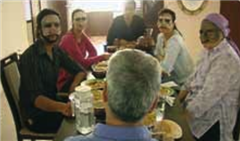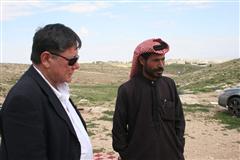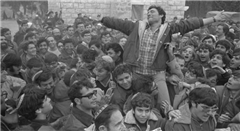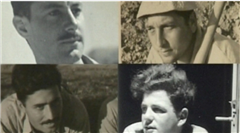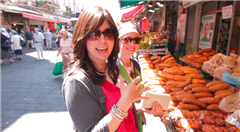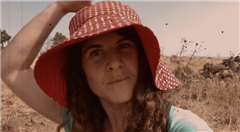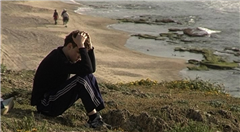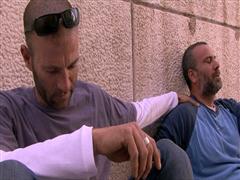The Yearning for a child of one’s own is a universal wish. And in this revelaing documentary, two journalists expose the harrowing experience they had as they go through fertility treatments. Orly and Guy are among Israel’s leading journalists. With a morning TV show, and biological children of their own from previous marriages, the two of them allow the camera to accompany them – even during their most intimate moments – on their journey through the medical and emotional worls of fertility treatments.
An invitation to embark on a magical journey into the filmmaker’s amusing life – this film is a mixture of reality and imagination. Mamdooh Afdile is a recent film school graduate waiting for his big break. His brother has other plans for them. And his parents believe in ghosts and demons. This hysterically funny film is a wild ride inside one family’s lunacy. We follow the filmmaker as he comes to terms with his family’s demons and attempts to confront his own.
The final chapter in the breakdown of the director’s family. The last thing that prevents the family’s collapse is the ground-level apartment in Jerusalem, where they manage to strike down roots.
Shlomo Lecker is an Israeli lawyer who defies all steriotypes. He is a Jew who gights for the Bedouins. In the Judean desert east of Jerusalem up to the Dead Sea, some 27,000 Bedouins live in roadside shacks. Since the 1970s, after Israel occupied the West Bank, Jewish settlements mushroomed up all along the desert and thereby limiting the Bedouins’ nomadic way of life. The steady expansion of Jewish settlements endangers the livelihood and the very existance of this community. This film follows Lecker’s personal relationship with his clients – the lone Israeli who claims that he has a Bedouin soul.
Winter, 1975. Hanan Porat is carried on the shoulders of dozens of men in Sebastia, in the heart of Samaria. Rabin’s government caves to the pressure of the settlers and authorizes the establishment of a settlement in Elon Moreh. At that moment, Hanan Porat became the leader and symbol of the settler movement. Today some 330,000 Jews live in dozens of settlements throughout the West Bank. Winter 2010, Hfanan is diagnosed with cancer. He knows that his days are numbered and goes on a journey through the key stations in his life. Hanan Porat: Settled in Faith is an historical document-personal and national. It presents the soul searching of Porat and of the entire Gush Emunim movement: was it a right choice to dedicate his life to public activity instead of Torah study and spirituality? Did the political path which he chose prove itself? What was the price exacted by the settlement enterprise? Will the destruction of the Jewish settlements in Gaza be repeated in the West Bank?
Four friends in their eighties, close friends since they were 16, tell their stories about their experiences over the past 60 or so years. They were together in agricultural schools, volunteered for the “Palmach,” and fought in the War of Independence. They describe the places where they fought, how the war influenced their lives, and about the difficult situations they experienced. After the war they established a Kibbutz, but eventually they went their separate ways, though the four and their families stayed in close contact for over 60 years. The film raises thoughts, questions and criticism regarding what happened to their ideals and the country they fought for and how they see the future of Israel
When famous food personality Jamie Geller decided to fulfill her dream and make Aliyah, Nefesh B’Nefesh teamed up with her to produce a documentary series following her and her family’s exciting and emotional journey to Israel, every step of the way. An award-winning US TV producer and best-selling author in addition to cooking celebrity, Jamie was uniquely qualified to create and produce the making of such a series, portraying an honest and vivid look behind the scenes of her move. The series is made up of individual episodes offering a glimpse of the emotional moments the Geller family experienced as they packed their belongings, said goodbye to family and friends, and departed on their special Aliyah charter flight in August 2012. It also features the family’s tear-jerker landing in Israel along with hundreds of fellow Olim while documenting their first few weeks as new Israeli citizens.
My family has a tradition of deceptions where love is concerned. I was named for my great-grandmother, Shoshana Reizel, who was ten years older than her husband, but he didn’t know that until the day he died. Shoshana Reizel’s son, Yaakov, was twenty years older than his wife, our grandmother, Tzippora, but he did not reveal that to her until after the wedding. Am I, too, preserving the family tradition of secrets and deceptions? Is there a limit to love?
Tom grew up in Israel, the daughter of a Holocaust survivor father and a German mother who had volunteered on Kibbutz Yotvata as penance for the sins of her fathers. Her mother raised three daughters in Israel, but insisted on preserving her identity; at home the language was German and they celebrated Christmas. Like every Israeli child, Tom absorbed Jewish-Israeli traditions through the education system. Her childhood was colored with stories of heroism, memorial ceremonies, and holidays, but the magic was clouded by a sense of not belonging. Tom herself eventually moved to Germany, but after 17 years of raising her own children in Munich, she once again begins to wonder about her roots, her home, and her identity. In this fascinating film, the filmmaker brings her German children to live in Israel for a year. Six-year-old Shira and 15-year-old Daniel go to school and absorb the language and culture. They discover their second identity while Tom goes on a journey to discover her first and to try to bequeath to her children a single, clear identity. At the year’s end, Daniel and Shira are familiar with Israel’s holidays, language, and customs, but has their mother achieved her goal?

